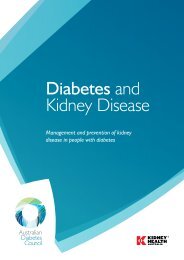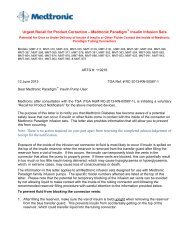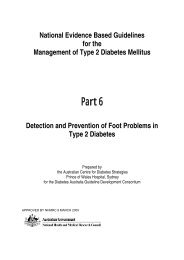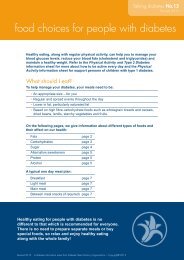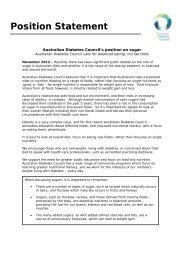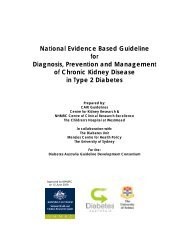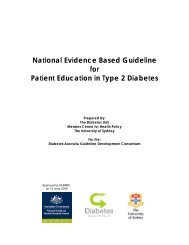Tamil - Australian Diabetes Council
Tamil - Australian Diabetes Council
Tamil - Australian Diabetes Council
- No tags were found...
Create successful ePaper yourself
Turn your PDF publications into a flip-book with our unique Google optimized e-Paper software.
12<br />
Insulin<br />
The pancreas is a part of the body situated behind the stomach that produces a hormone<br />
called insulin.<br />
Without insulin, the cells in our bodies would not be able to use the glucose (sugar) to provide<br />
energy.<br />
In type 1 diabetes the pancreas does not make any insulin and<br />
glucose levels build up in the blood. Insulin by injection or by<br />
insulin pump is required for life. A person with type 2 diabetes or<br />
gestational diabetes may also require insulin to keep their blood<br />
glucose levels within the recommended range.<br />
Your doctor may decide that insulin is needed as well as oral<br />
medications, or that insulin may be better than oral medications.<br />
This does not mean that you have failed in your diabetes<br />
management. It has been decided that insulin is necessary to<br />
maintain good diabetes management.<br />
All insulins lower blood glucose levels. Low blood glucose or<br />
hypoglycaemia can be a side effect of insulin treatment. It is<br />
essential to know how to recognise and treat low blood glucose or<br />
a hypoglycaemic episode.<br />
There are many types of insulins available, you and your doctor<br />
will discuss which is right for you. If you have any questions or<br />
concerns about starting on insulin you can also contact your<br />
diabetes educator.<br />
Key points to know are:<br />
• Type and amount of insulin to be used<br />
• Time to take your insulin and when to eat<br />
• The time your insulin has it’s greatest effect and how long it stays in your body<br />
• When to test your blood glucose (sugar) level<br />
• When to contact your doctor or diabetes health care team.<br />
Tell your doctor or diabetes educator of any changes in your lifestyle, working<br />
hours, physical activity or meal times. They will advise you if you need to change<br />
your insulin treatment .<br />
56




